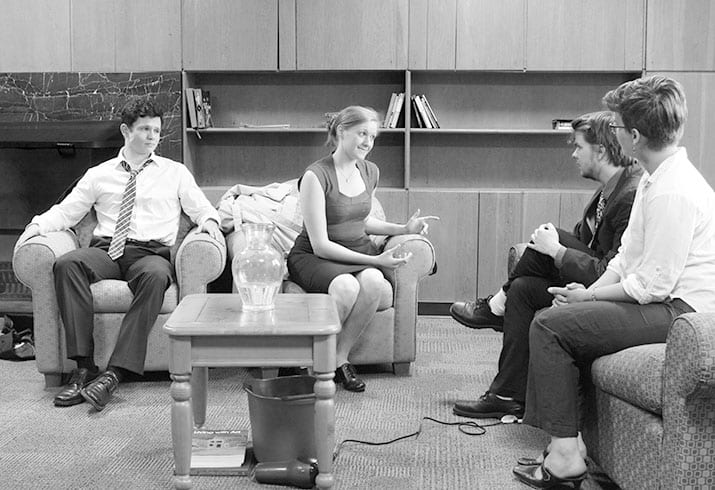
A stuffy, sweltering dorm basement might not be a theatergoer’s ideal venue for a full-length play, but Deep End Production’s run of God of Carnage took advantage of the environment. The weekend of May 1 through 3, four actors took the stage corner of the room in the Thorson basement lounge who knew that existed?. The intimate – and humid – location reflected perfectly the suffocating environment of the action on stage.
Written by Yasmina Reza, translated to English by Christopher Hampton and directed by Nathan Aastuen ’17, God of Carnage displays the intensely awkward turned totally dark meeting between two sets of parents whose 11-year-old sons got into a playground fight.
In a Lord of the Flies-esque commentary on the darker sides of human nature, God of Carnage explores the interactions of these four parents as they transition from polite to maniacal, yanking audience members into each painful moment.
Lily Bane ’17 played Veronica Novak, the hippie-writer mother who called the other unwilling parties to meet. Bane drove the action during the first half of the play, bringing the awkwardness of the situation to new heights with each enunciated, pointed comment.
Opposite Veronica were Alan Raleigh Morgan Keefe ’15 and Annette Raleigh Kim Sesvold ’18, the parents of stick-wielding Benjamin, who, as the audience learns, has hit Henry Novak in the face with a stick and knocked out two of his teeth. Within moments of the play’s opening, the tension between Keefe’s and Sesvold’s characters is palpable. Audience members not already sweating in the heat of the Thorson basement certainly began to perspire as they were immersed in the tension of the Raleighs’ marriage.
Chaz Mayo ’18 played Veronica’s husband, Michael Novak, and provided the much-needed comic relief for the majority of the performance. While Michael’s lines were not always funny in themselves, Mayo hammed up their execution, which kept a grateful audience from plunging into complete despair 20 minutes into the show.
Although it was an intimate basement play with a simple set and no scene changes, God of Carnage boasted excellent special effects. During the first half of the play, Annette repeatedly announces that she does not feel well. The claim seems pretty benign – and understandable considering the toxic nature of the characters’ situation – until Annette, clutching a pillow to her chest, vomits all over the coffee table and carpet.
The vomit was impressive. Victoria Westman ’18, whom the program credited as “Props Master,” deserves some major kudos for creating professional puke for this mom-and-pop production.
Sloshed on rum, Alan dropped his cell phone in a vase full of water on purpose, of course, tulips thrown across the living room and a real window for characters to look out complimented the impressive vomit pillow for a deceptively complex cast of props.
The cast of four college students playing embittered, middle-aged parents seemed at times ridiculous – and perhaps overdone. But the presumably parents in the audience absolutely cracked up when Mayo and Keefe delivered monologues or one-liners about the nature of marriage or parenthood. The actors must have hit home.
Further, the cast’s ability to live in the dark space the script constructs without losing the moments of humor buried within was unexpected – and impressive. By the end of the play, the characters are all screaming, crying and throwing things at one another, demonstrating behavior just as childlike as that of their 11-year-old sons. Theme of the play, anyone? The paper printouts on the door warning audience of “mild language” in the play were certainly understated.
Reza’s script is subtle and complicated, the epitome of a dark comedy. And the actors got that. During the closing scene, audience members could hear snickers on one side of the room and whimpers on the other. At once sad and funny, God of Carnage asks for these reactions as it prompts audience members to consider their own humanity.
In his program notes, Aastuen writes that “Reza probes into the questions that our society tends to ignore, especially in our passive-aggressive Minnesotan bubble.” For 80 minutes in a sweaty Thorson basement, Aastuen and his cast had at least a handful of these Minnesotan bubble-dwellers paying attention.
belisle@stolaf.edu
Photo Credit: SONJA NELSON/MANITOU MESSENGER

